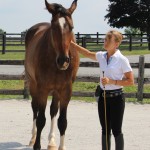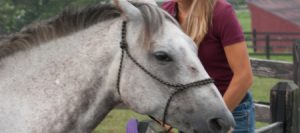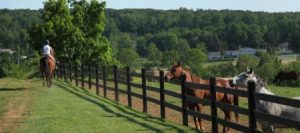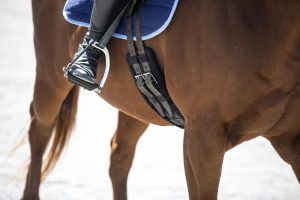Emotion is an important topic in training. Emotion has a huge impact on actions or behaviors, and this as true for people as it is for animals.
Emotional control isn’t discussed much in traditional horse training although it is still very important as horses can easily become frustrated, agitated, distracted, fearful, etc. Emotional control is discussed very often in regards to positive reinforcement training, however, because positive reinforcement brings in a whole new set of emotions. Positive reinforcement can be fun for the animal, and with fun you can get excitement, motivation, and spontaneity. These emotions are part of what makes positive reinforcement so effective, but with horses we have to be careful with these emotions.
Emotional Control may not be as critical for smaller animals
This is where I am learning that training a dog (or a goat ;)) can be very different than training a horse. If my dog gets really excited during training and runs so fast that she knocks into me when I tell her to “come” I really don’t mind – she’s a mini dachshund and I love that she is really “driving” to me as my dog training class calls it. Or when Francine, the pygmy goat I am playing with, jumps up on me as she tries different things to see what is going to earn the next click, it’s not a big deal.
But horses are big, they can easily hurt us when they get excited or fearful, and that is what makes the difference in how focused we need to be on emotional control when we are training. We also have to be careful when we assign meaning to an animal’s behaviors. For example, no one gives it a second thought when a cute little dog like my dachshund jumps up at them, but if a horse rushes over and crowds someone’s space it is often referred to as the horse being dominant or trying to establish his place in the pecking order, when really it may not have any more meaning than the same excitement exhibited by my little dog. With the horse, however, rushing around and crowding are obviously unacceptable for safety reasons.
When we reinforce something, especially in positive reinforcement, where food is often involved, we are not just reinforcing the behavior the animal just did, we are also reinforcing the emotion behind the behavior, as well as any other behaviors that the animal was doing in that moment. This is where training truly becomes an art because the trainer has to be so aware of everything that is going on and what connections the animal may be making- whether they are the desired ones or not. When we work with our horses, we want them to remain be responsive, attentive, and focused, yet calm and quiet as well.
Our Emotions Matter Too
Emotional control isn’t just important for our animals however. We also need to be very aware of the emotions we bring into a training session or the ones that develop during the session. For example, I was working with a Chincoteague gelding named Phoenix, working on teaching him to simply walk calmly next to me. He was frustrated and trying all the behaviors that used to bring him food – tossing his head, pinning his ears, stopping to paw the ground, etc. But as I was watching all his frustration I had to stop and laugh at myself because I realized that I was every bit as frustrated as he was in that moment. So I stopped the session and we picked it up again later that day with much better results.

Just like our horses, we are going to behave differently depending on what emotions we are operating on. Especially since horses are so in tune to how we feel and the energy, if you will, that we give off, it is every bit as important for us to work on our emotional control as it is working on our horse’s emotions. I believe that one of the most important steps to maintaining and developing emotional control is by taking things slow and breaking down the training into small pieces so that the human knows exactly what they expect and the horse can experience success and “getting the right answer” whether that comes with a reward or a release of pressure.
Also, when we consider emotion – whether our own or emotions are horse seems to be displaying, I find it very helpful to look at emotion objectively and ask the question of why am I feeling this way or why is my horse displaying this emotion/behavior without making it too personal. For example, if you start to feel fearful, don’t beat yourself up for being a wimp or not being able to “get ahold of yourself”. Instead, think – why do I feel this way? What triggered it? Where do I feel it in my body? This separates you as a person from the emotion you are feeling in that moment and makes it much easier for that emotion to change.
We can’t always control our emotions, or those of our horses, but being aware of emotion is critical to effective riding and training. What are your thoughts? What is an example of an emotion you felt in yourself or saw in your horse that you were able to change?
For more tips and information in this subject visit my Calm & Confident Rider Free Resource
See you in the comments,
Callie















22 Responses
Have been reading loads on this very subject – how horses ‘read’ us even before we approach them closely and that they are highly sensitive to our emotions, feelings and physical condition. What intelligent, intuitive, beautiful creatures they are. I help to care for school horses every week and always make quiet, one to one time with each one. Without exception, each horse and pony responds to a peaceful, calm presence and can be seen to relax to a gentle, kind hand on the cheek and neck. They give so much in return. Thanks for this blog Callie. Love your stuff!
It is amazing how they do respond to that calm presence – I believe it is because naturally they are so calm and peaceful as well.
What is the title of the book called you were reading?
Callie
So true ! Was on a trail ride with my Quarab Fred and suddenly staying feeling like I was going to cross paths with a local momma bear with her cubs. Fred must have felt that energy and started overreacting to the birds singing. Realizing I had created this tension I quickly relaxed and Fred did as well.
Laura
Hi Callie, I’ve learned that being aware of my surroundings allows me to calm down if horses are antsy. You can certainly have a calm demeanor but when other riders are more rambunctious — it causes every horse to wonder what all the excitement is about !
Thankfully I ride at a small barn so it’s much quieter. I had to laugh at “wimp” cause that’s exactly how I feel if the horse feels a little off, or quick, or just not in tune.
My instructor and I work together on using the first 15-20 mins with deep breathing, relaxing from head to toe. Once I pick up my stirrups and feel the confidence to move on, the horses seem to enjoy that. No matter how much I look forward to lesson time, I feel apprehensive and tense. As I relax and progress, I notice the horse starts working with me.
Hi Callie
I do not own a horse but I ride once a week in the woods and on the beach (trot,canter and gallop and the one important thing I have learned is that if you have any worries or problems DO NOT TAKE them with you,,,the horse amazingly enough will react.. if possible before entering the stables clear your mind and think only of the ride and control of the horse..incidently I ride the same horse every week.
regards
alan
Well put, Alan – don’t take your problems with you to the barn!
Trying to ride Sedona in the arena today while many of the other horses out in the pasture were whinnying. She was very excited by all of the commotion and it was hard to get her to work. Finally have up and let her go back with her buddies in the pasture!
Great post Callie. Thanks!!!
I just started my first horse riding classes last week and I’m so thankful to have found your blog at the beginning of my “journey”. Sometimes, or most of the time, little things make a huge difference and in my new experience with horses, I find this to be truer than ever. Thank you for the free posts, really looking forward to the next one! 🙂
Welcome Sorin, glad you are enjoying the posts and videos!
Thank you for this article. It’s nice to see someone else explaining clearly that we also reward the emotion behind the action when working with positive reinforcement/food reward, as I think this is often overlooked.
I used to work with food reward in the past and got the horses nicely waiting for their reward, never demand etc. However, I did notice with some games they were doing exactly what I’ve rewarded but the feel with which they were going it, was not what I was looking for and especially not what I wanted my horses to feel; which was mostly a frustrated, impatient feel because of the food they already had in mind. I think it’s very important that, if you decide to work with positive reinforcement, to reward the feeling that is pleasant for both you and your horse.
Regards to emotions and mutual empathy, this is where Equine Assusted Coaching/Therapy/healing is based on but unfortunately often forgotten or not even discussed in training or working with horses. It can even go a layer deeper than just mirroring what the horse feels of us in that moment. Sometimes or often they mirror while life experiencing or a situation we are dealing with at that moment in other areas of our life that have nothing to do with what happens in the moment we are with our horse. For example, one time one of my clients couldn’t ask her horse to move forward. No matter what she did, he just ignored every try and just planted his feet or zoomed out. He was literally stucked, where he normally moved fine in the groundwork and I didn’t had any problems either. Even though the lady wasn’t necessarily stuck in the training or with him, she had some important decisions to make in other areas of her life which she found really hard. So everything seem to ‘stand still’ and she was literally stuck.
Of course we also pick up on our horses emotions, the degree depending on our sensitivity or how tuned in we are. Horses are obviously even more sensitive to this than we are so its good to keep this in mind always when we’re training.
Thank you Callie for wording everything so well and bringing this subject under the attention!
Hi Danielle,
Thanks for your comment! What an eye opening experience with your client and her horse. It is amazing how sensitive horses can be.
I have taken on a older ex riding school pony and some days we have great achievements and other days I can feel very low with our progress
But we are making xml steps all the time and seeing as I am still a novice rider and owner we are both constantly learning
A new lady and her daughter have just come to our yard and she has passed on some natural horseman ship techniques for us to do and it has made a massive difference especially with leading
With horses you never stop learning and it is a frustrating journey but also hugely worthwhile
Love all your blogs thankyou
Thanks Bridget, and keep up the good work with your new horse!
Hi Callie!
Thanks again for an insightful article. One thing about taking emotions to the barn is that it can sometimes help. I felt on the blah side the other day, went out and got my sweet boy, put my head to his,and felt better! (He didn’t seem to mind…) We had a lovely ride together.
Very much a thought provoking article Callie. Horses are so tuned in to their rider, as the rider should be tuned in to their horse. Equine management with a calm open mind reaps fab results. Bravo for your article, always superb. Linda 🙂
I am 72 years old and have owned my first horse for almost 3 yrs. He is a rescue and tripped a lot when I got him. It took a little time to figure out his problem but I found a vet that specialized in lameness and after ex rays ,etc. he is now in corrective shoes to align the bones in his front feet. He has worn these for 7 months and it stopped his tripping except for when he is not paying attention. Just recently, however, he has tripped on some stones and went down on his knees. I was on bareback, just walking, and he righted himself and has no injury from the fall. The other problem we had was colic, twice this past Summer so he is now off hay and is on soaked Timothy pellets. I was giving him 1/3rd alfalfa but took him off this which I will explaine. He was in a snaffle when I first got him and I changed to a Tom Thumb when he gave me a small problem on the trail not wanting to go the way I wanted him to go. Recently he has become more spooky and seems alert and fearful of things he has never paid any attention. He is older, 20ish, and has always been pretty laid back so this is a big change. Yesterday I had been riding on the trail with one friend when a stranger on horseback came up behind us and startled my friends horse, talked for a minute to us, and then cantered off. We both circled our horses so they wouldn’t also canter off and from that moment I could feel the difference in my horse. He was amped up and when I tried to pull him back he threw his head and “danced” sideways. When he wouldn’t stop I bailed off. (Thanks you for the video I watched on how to do this)
I went to the tack shop and bought a snaffle bit and will use it with a chin strap. My question is: do you think it could be the bit being to severe because he is ok with it in the arena when I don’t have to use much rein at all but as soon as he gets a little out of control and I apply pressure he seems to fight it. He is making me anxious because 6 months before I owned him I had a pretty bad accident off a tb and was dragged and taken off the mountain by atv to the ambulance waiting on the road below.
Hi Judy,
Thanks for your comment! Sorry my response is a bit late! I would try the snaffle bit out on the trail and see how he goes with it. Sometimes bits like a tom thumb that operate with some leverage do seem to encourage head tossing if the horse learns that he can temorarily release the pressure from the bit or the curb strap through the head tossing.
Situations like the one you described are tough, because most horses will get excited when another takes off away from them. Try to be aware of what works best to calm your horse… circles, practicing transitions, allowing some grazing, even getting off and walking for a minute (its better to stay safe)… and then use that in those moments he starts to escalate.
Hope this helps, Callie
Hi Judy,
Do you remember the name of the video about bailing off? I can’t seem to find it.
Thanks!
Another great post, Callie! My horse tends to test my resolve to ride by tossing his head, backing up, and threatening to rear or buck. I found that circles will calm and unstick his feet eventually. It’s just difficult for me, as I’m afraid he needs that “electric fence” correction, and I fear I won’t stay on for his reaction!
Hi Callie
I think you are amazing. thank you for your videos! you are a great resource. the horse I ride helps me work on a personal issue I have struggled with for a long time. I am always too passive and tend to let people walk over me and then after I have had too much I get upset and show my frustration or say something I regret which hurts my relationship with the person. my horse back riding instructor could sense this was an issue only after knowing me for a couple months and paired me with a wonderful horse to help me with this – I always have to be the boss and always in a kind and positive way. we have a great relationship and he helps me work on setting boundaries in a positive way every time we work together.
Thank you for all your help – I greatly appreciate you!
Britt
Thank you Britt! Keep up the great work with your lessons and your new equine “partner”.